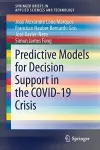
Predictive Models for Decision Support in the COVID-19 Crisis
4 authors - Paperback
£54.99
Professor João Alexandre Lobo Marques gained his master’s degree in 2007 and his PhD in 2009, both from the Federal University of Ceará, UFC, Brasil. He works as an associate professor at the University of Saint Joseph, Macau, and as a visiting associate professor at the Chinese Academy of Sciences. He is the CEO and co-founder of the XS Innovation Group in Brazil, which is focused on bioengineering innovation for education. He has published over 60 journal and conference papers, and has co-authored three books. His research interests include computational and artificial intelligence, data sciences, and neuroeconomics.
Professor Francisco Nauber Bernardo Gois is an adjunct professor at the Federal University of Ceará. He holds a master’s degree and a PhD from the University of Fortaleza, gained in 2010 and 2017 respectively. He has experience in computer science, with emphasis on machine learning and software testing, deep learning, continuous integration, testing and extreme programming.
Dr José Xavier Neto holds a medical degree from Federal University of Ceará and a PhD from the University of São Paulo, which he gained in 1989 and 1993 respectively. He has worked in medical research for decades, including his current role as the Chief Health Scientist of Ceará and a Visiting Professor at the Federal University of Ceará. He has been involved in creating an experimental model for developmental neuropathy induced by the Zika virus, as well as leading a multidisciplinary team which described the first fossilised heart.
Professor Simon James Fong gained his master’s degree and PhD from La Trobe University in 1994 and 1998 respectively. He has worked in several academic positions, including his current role as Associate Professor at the University of Macau. He has been on the committee for several conferences, including acting as chair, and has worked as a book series editor. His research interests include data mining, artificial intelligence, machine learning, and biomedical applications.